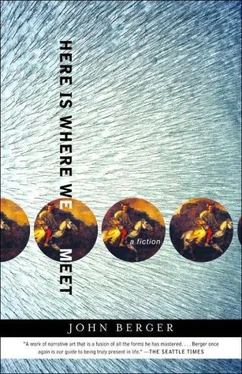John Berger
Here Is Where We Meet
For
Chloe
Lucy
Dimitri
Melina
Olek and
Maciek
In the centre of a square in Lisboa there is a tree called a Lusitanian (which is to say, Portuguese) cypress. Its branches, instead of pointing up to the sky, have been trained to grow outwards, horizontally, so that they form a gigantic, impenetrable, very low umbrella with a diameter of twenty metres. One hundred people could easily shelter under it. The branches are supported by metal props, arranged in circles around the twisted massive trunk; the tree is at least two hundred years old. Beside it stands a formal notice-board with a poem to passers-by written on it.
I paused to try to decipher a few lines:
. . I am the handle of your hoe, the gate of your house, the wood of your cradle and the wood of your coffin. .
Elsewhere in the square chickens were pecking for worms on the unkempt grass. At several tables men were playing sueca, each one selecting and then placing his card on the table with an expression that combined wisdom and resignation. Winning here was a quiet pleasure.
It was hot — perhaps 28 °C — at the end of the month of May. In a week or two, Africa, which begins — in a manner of speaking — on the far bank of the Tagus, would begin to impose a distant yet tangible presence. An old woman with an umbrella was sitting very still on one of the park benches. She had the kind of stillness that draws attention to itself. Sitting there on the park bench, she was determined to be noticed. A man with a suitcase walked through the square with the air of going to a rendezvous he kept every day. Afterwards a woman carrying a little dog in her arms — both of them looking sad — passed, heading down towards the Avenida da Liberdade. The old woman on the bench persisted in her demonstrative stillness. To whom was it addressed?
Abruptly, as I was asking myself this question, she got to her feet, turned and, using her umbrella like a walking stick, came towards me.
I recognised her walk, long before I could see her face. The walk of somebody already looking forward to arriving and sitting down. It was my mother.
It happens sometimes in my dreams that I have to phone my parents’ flat, in order to tell them — or to ask them to tell somebody else — that I’m likely to be late, because I’ve missed a connection. I want to warn them that I’m not, at that moment, where I’m meant to be. The details vary from dream to dream, but the gist of what I have to tell them remains the same. What also remains the same is that I don’t have my address book with me, and, although I attempt to remember their telephone number and try out several, I never find the right one. This corresponds with the truth that in my waking life I have forgotten the telephone number of the flat in which my parents lived for twenty years and which I once knew by heart. What, however, I forget in my dreams is that they are dead. My father died twenty-five years ago and my mother ten years later.
In the square, she took my arm and by common consent we crossed the street and walked slowly towards the top of the Mãe d’Agua staircase.
There’s something, John, you shouldn’t forget — you forget too much. The thing you should know is this: the dead don’t stay where they are buried.
As she began talking, she didn’t look at me. She looked concentratedly at the ground a few metres ahead of us. She was worried about tripping.
I’m not talking about heaven. Heaven is all very well, but I happen to be talking about something different!
She paused and chewed as if one of the words had gristle on it and needed more chewing before being swallowed. Then she went on:
The dead when they’re dead can choose where they want to live on Earth, always supposing they decide to stay on the Earth.
You mean they come back to some place where they were happy when they were alive?
We were by now at the top of the stairway and with her left hand she took hold of the rail.
You think you know the answers, you always did. You should have listened more to your father.
He had answers to many things. I see that today.
We took three steps down.
Your dear father was a man full of doubts, that’s why I had to be behind him all the while.
To rub his back?
Amongst other things, yes.
Another four steps. She took her hand off the rail.
How do the dead choose where they want to stay?
She didn’t answer, instead she gathered up her skirt and sat down on the next step of the staircase.
I’ve chosen Lisboa! she said, as if repeating something very obvious.
Did you ever come here — I hesitated, for I didn’t want to make the distinction too blatant — before?
Again she ignored the question. If you want to find out something I didn’t tell you, she said, or something you’ve forgotten, this is the time and place to ask me.
You told me so little, I observed.
Anybody can tell! Tell! Tell! I did something else. She looked demonstratively into the distance, towards Africa on the other side of the Tagus. No, I was never here before. I did something else, I showed you.
Is Father here?
She shook her head.
Where is he?
I don’t know and I don’t ask him. I fancy he may be in Rome.
Because of the Holy See?
For the first time she looked at me, the little triumph of a joke in her eyes.
Not at all; because of the tablecloths!
I put my arm round her. Gently, she removed my hand from her arm, and still holding it in hers, placed both our hands on the stone step.
How long have you been in Lisboa?
Don’t you remember my warning you how it would be like this? I told you it would be like this. Beyond days or months or hundreds of years, beyond time.
Again she was peering towards Africa.
So time doesn’t count, and place does? I said this to tease her. When I was a man, I liked teasing her and she went along with it, consenting, for it reminded us both of a sadness that had passed.
When I was a child her sureness enraged me (regardless of the argument involved). It was a sureness that revealed — at least to my eyes — how, behind the bravado, she was vulnerable and hesitant, whereas I wanted her to be invincible. Consequently, I would contradict whatever it was she was being so certain about, in the hope that we might discover something else, which we could question together with a shared confidence. Yet what happened, in fact, was that my counter-attacks made her more frail than she usually was, and the two of us would be drawn, helpless, into a maelstrom of perdition and lamentation, silently crying out for an angel to come and save us. On no occasion did an angel come.
The animals at least are here to help us, she said, looking at what she took to be a cat basking in the sun ten steps down.
It’s not a cat, I said. It’s an old fur hat, a chapka.
That’s why I was a vegetarian, she said.
You loved fish! I contested.
Fish are cold-blooded.
What difference does that make? If it’s a principle, it’s a principle.
Everything in life, John, is a question of drawing a line, and you have to decide for yourself where to draw it. You can’t draw it for others. You can try, of course, but it doesn’t work. People obeying rules laid down by somebody else is not the same thing as respecting life. And if you want to respect life, you have to draw a line.
So time doesn’t count and place does? I asked again.
It’s not any place, John, it’s a meeting place. There aren’t many cities left with trams, are there? Here you can hear them all the while — except for a few hours during the night.
Читать дальше












